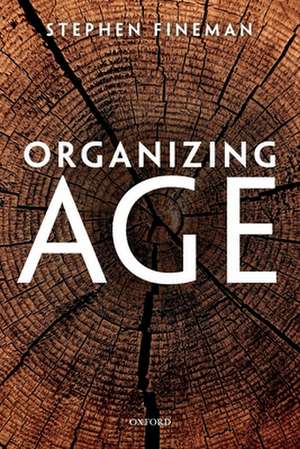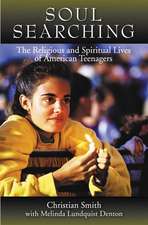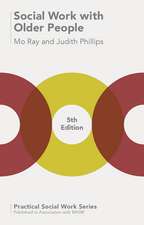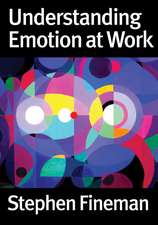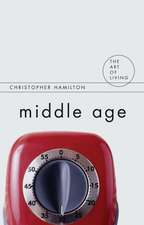Organizing Age
Autor Stephen Finemanen Limba Engleză Paperback – 5 mai 2011
| Toate formatele și edițiile | Preț | Express |
|---|---|---|
| Paperback (1) | 304.10 lei 31-37 zile | |
| OUP OXFORD – 5 mai 2011 | 304.10 lei 31-37 zile | |
| Hardback (1) | 655.67 lei 31-37 zile | |
| OUP OXFORD – 12 mai 2011 | 655.67 lei 31-37 zile |
Preț: 304.10 lei
Preț vechi: 332.60 lei
-9% Nou
Puncte Express: 456
Preț estimativ în valută:
58.20€ • 63.19$ • 48.88£
58.20€ • 63.19$ • 48.88£
Carte tipărită la comandă
Livrare economică 11-17 aprilie
Preluare comenzi: 021 569.72.76
Specificații
ISBN-13: 9780199578054
ISBN-10: 0199578052
Pagini: 188
Ilustrații: Numerous illustrations
Dimensiuni: 165 x 234 x 15 mm
Greutate: 0.32 kg
Editura: OUP OXFORD
Colecția OUP Oxford
Locul publicării:Oxford, United Kingdom
ISBN-10: 0199578052
Pagini: 188
Ilustrații: Numerous illustrations
Dimensiuni: 165 x 234 x 15 mm
Greutate: 0.32 kg
Editura: OUP OXFORD
Colecția OUP Oxford
Locul publicării:Oxford, United Kingdom
Recenzii
Fineman mixes popular and social scientific thinking, often insightfully and thoughtfully ... he demonstrates well ageisms pervasiveness, influence and neglect by social science.
The question that Fineman poses at the end of the chapter on retirement: Is it time to shift our thinking about the relationship between work and retirement and, indeed, the very validity of retirement as a construct? (p. 130) encapsulates what is really good about this book. Fineman offers us a broad brush view of the way in which age is socially constructed and proffers some simulating questions that could help frame new research into the organization of ageing or deepen existing investigations ... but for students, academics and policy makers who are interested in exploring age beyond a simplistic view of age as chronological and generational markers then this is a must read.
Timely and relevant ... a valuable contribution to a field of study that is attracting more and more scholarly attention, rightly so. I recommend this text as an essential read for anyone interested in this topic area, but also as a supplementary text on academic courses that adopt a critical perspective on analysing aspects of individual difference in the workplace, and how these are managed by organizations.
Provides a broad perspective on the ways in which age is defined in various disciplines and various points in history... the book fills a literature gap, and it does so in a way which most people would find approachable and at times entertaining ... Organizing Age is welcomed as it paves the way for a greater understanding of how we view age and will be valuable in breaking down the barriers of ageism.
The question that Fineman poses at the end of the chapter on retirement: Is it time to shift our thinking about the relationship between work and retirement and, indeed, the very validity of retirement as a construct? (p. 130) encapsulates what is really good about this book. Fineman offers us a broad brush view of the way in which age is socially constructed and proffers some simulating questions that could help frame new research into the organization of ageing or deepen existing investigations ... but for students, academics and policy makers who are interested in exploring age beyond a simplistic view of age as chronological and generational markers then this is a must read.
Timely and relevant ... a valuable contribution to a field of study that is attracting more and more scholarly attention, rightly so. I recommend this text as an essential read for anyone interested in this topic area, but also as a supplementary text on academic courses that adopt a critical perspective on analysing aspects of individual difference in the workplace, and how these are managed by organizations.
Provides a broad perspective on the ways in which age is defined in various disciplines and various points in history... the book fills a literature gap, and it does so in a way which most people would find approachable and at times entertaining ... Organizing Age is welcomed as it paves the way for a greater understanding of how we view age and will be valuable in breaking down the barriers of ageism.
Notă biografică
Throughout a distinguished career, Professor Fineman has written extensively in journals, monographs, and textbooks on the political and emotional features of life in organizations. He has been at the forefront of introducing critical, constructionist approaches to the study of organizations in works such as Emotion in Organizations (2000) and Understanding Emotion at Work (2003). He has long been an advocate of blending psychological, sociological, and anthropological insights in our appreciation of organizational phenomena, such as stress, unemployment, greening, leadership, and change.
